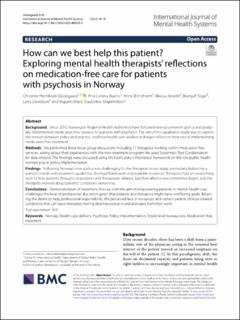| dc.contributor.author | Ødegaard, Christine Henriksen | |
| dc.contributor.author | Ruano, Ana Lorena | |
| dc.contributor.author | Blindheim, Anne Alnes | |
| dc.contributor.author | Veseth, Marius | |
| dc.contributor.author | Stige, Brynjulf | |
| dc.contributor.author | Davidson, Larry | |
| dc.contributor.author | Engebretsen, Ingunn Marie Stadskleiv | |
| dc.date.accessioned | 2022-06-07T12:00:32Z | |
| dc.date.available | 2022-06-07T12:00:32Z | |
| dc.date.created | 2022-04-28T17:02:22Z | |
| dc.date.issued | 2022 | |
| dc.identifier.issn | 1752-4458 | |
| dc.identifier.uri | https://hdl.handle.net/11250/2997712 | |
| dc.description.abstract | Background
Since 2015, Norwegian Regional Health Authorities have followed new government policy and gradually implemented medication-free services for patients with psychosis. The aim of this qualitative study was to explore the tension between policy and practice, and how health care workers in Bergen reflect on their role in implementing medication-free treatment.
Methods
We performed three focus group discussions including 17 therapists working within medication free services, asking about their experiences with this new treatment program. We used Systematic Text Condensation for data analysis. The findings were discussed using Michael Lipsky’s theoretical framework on the role public health workers play in policy implementation.
Findings
Following Norway’s new policy was challenging for the therapists in our study, particularly balancing a patient’s needs with treatment guidelines, the legal framework and available resources. Therapists had an overarching wish to help patients through cooperation and therapeutic alliance, but their alliance was sometimes fragile, and the therapists worried about patients’ conditions worsening.
Conclusions
Democratization of treatment choices, with the aim of empowering patients in mental health care, challenges the level of professional discretion given that patients and therapists might have conflicting goals. Balancing the desire to help, professional responsibility, the perceived lack of resources, and certain patient choices created conditions that can leave therapists feeling disempowered in and alienated from their work. | en_US |
| dc.language.iso | eng | en_US |
| dc.publisher | BMC | en_US |
| dc.rights | Navngivelse 4.0 Internasjonal | * |
| dc.rights.uri | http://creativecommons.org/licenses/by/4.0/deed.no | * |
| dc.title | How can we best help this patient? Exploring mental health therapists’ reflections on medication-free care for patients with psychosis in Norway | en_US |
| dc.type | Journal article | en_US |
| dc.type | Peer reviewed | en_US |
| dc.description.version | publishedVersion | en_US |
| dc.rights.holder | Copyright The Author(s) 2022 | en_US |
| dc.source.articlenumber | 19 | en_US |
| cristin.ispublished | true | |
| cristin.fulltext | original | |
| cristin.qualitycode | 1 | |
| dc.identifier.doi | 10.1186/s13033-022-00529-8 | |
| dc.identifier.cristin | 2019919 | |
| dc.source.journal | International Journal of Mental Health Systems | en_US |
| dc.identifier.citation | International Journal of Mental Health Systems. 2022, 16, 19. | en_US |
| dc.source.volume | 16 | en_US |

